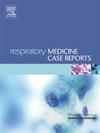克唑替尼对携带mip - ros1融合基因的晚期肺腺癌患者的显著疗效:1例报告
IF 0.7
Q4 RESPIRATORY SYSTEM
引用次数: 0
摘要
对于晚期非小细胞肺癌(NSCLC)患者,基因检测对于识别可靶向驱动基因的改变至关重要。ROS1-酪氨酸激酶抑制剂已显示出对具有常见ROS1融合基因的NSCLC的疗效,但罕见的融合伴侣对治疗结果的影响尚不清楚。在这里,我们描述了一位75岁的晚期肺腺癌女性患者,在发现极其罕见的mip - ros1融合后接受克唑替尼治疗。尽管由于不良反应而逐步减少剂量,但患者对克唑替尼表现出显着的肿瘤反应。即使在减少剂量的情况下,持续的反应也突出了靶向治疗mrip - ros1融合治疗NSCLC的潜力。这个案例也强调了综合基因组分析的重要性,利用基于杂交捕获的下一代测序来识别罕见的驱动基因改变,而传统的基于靶标测序的方法可能无法检测到这些改变。本文章由计算机程序翻译,如有差异,请以英文原文为准。
Remarkable response to crizotinib in a patient with advanced lung adenocarcinoma harboring the MPRIP-ROS1 fusion gene: A case report
For patients with advanced non-small cell lung cancer (NSCLC), genetic testing is crucial to identify alterations in targetable driver genes. ROS1-tyrosine kinase inhibitors have shown efficacy against NSCLC with common ROS1 fusion genes, but the impact of rare fusion partners on therapeutic outcomes is not well understood. Here, we describe a 75-year-old female with advanced lung adenocarcinoma who was treated with crizotinib after the identification of the extremely rare MPRIP-ROS1 fusion. Despite stepwise dose reductions due to adverse effects, the patient exhibited a significant tumor response to crizotinib. The sustained response, even at reduced doses, highlights the potential for targeted therapies in managing NSCLC with MPRIP-ROS1 fusion. This case also underscores the importance of comprehensive genomic profiling using hybrid capture-based next-generation sequencing to identify rare driver gene alterations that may not be detected by conventional target sequencing-based methods.
求助全文
通过发布文献求助,成功后即可免费获取论文全文。
去求助
来源期刊

Respiratory Medicine Case Reports
RESPIRATORY SYSTEM-
CiteScore
2.10
自引率
0.00%
发文量
213
审稿时长
87 days
 求助内容:
求助内容: 应助结果提醒方式:
应助结果提醒方式:


